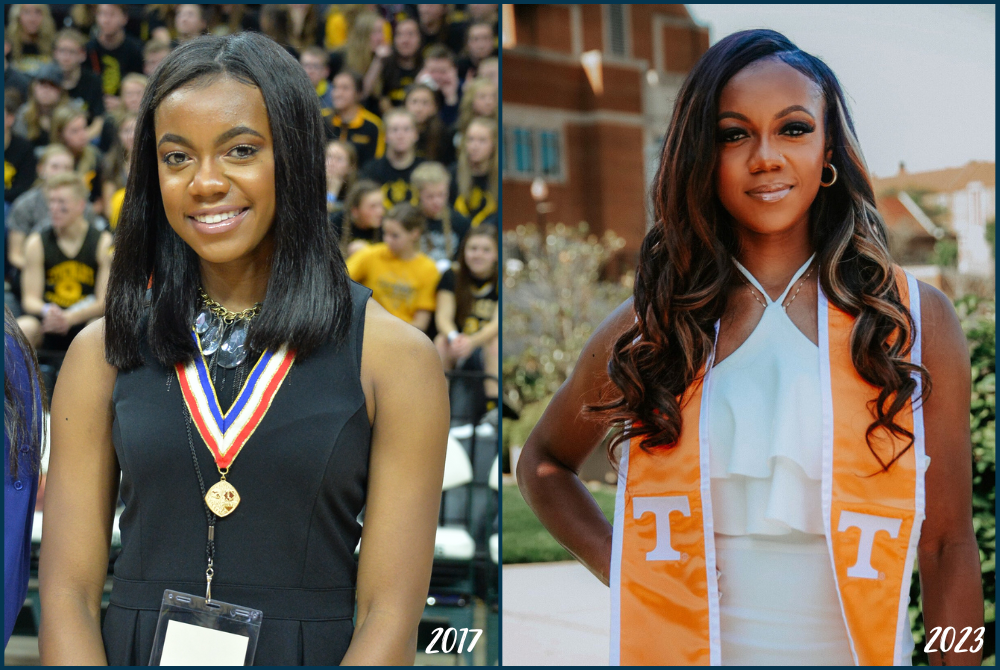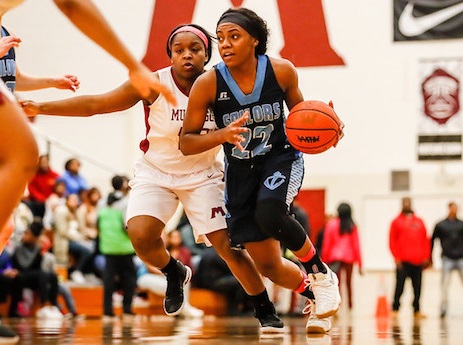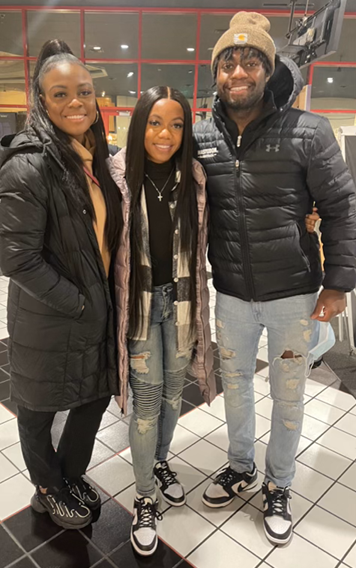
High School a Time for Plays of All Kinds
April 2, 2015
By Jack Roberts
MHSAA executive director
At end of season or school year banquets attended by student-athletes and their parents, I often tell this short story about my mother that never fails to get a good laugh, especially from mothers:
“At the end of my junior year of high school I attended the graduation ceremony for the senior class on a hot and humid early June evening in our stuffy high school gymnasium. The bleachers on each side were filled to capacity, as were several hundred folding chairs placed on the gymnasium floor.
“The public address system, which was wonderful for announcing at basketball games or wrestling meets, was awful for graduation speeches. Person after person spoke, and the huge audience wondered what they had to say.
“I was present because I was the junior class president; and as part of the ceremony, the senior class president handed me a small shovel. It had something to do with accepting responsibility or carrying on tradition.
“In any event, the senior class president spoke briefly; and then it was my turn. I stepped to the podium, pushed the microphone to the side, and spoke in a voice that was heard and understood in every corner of the gymnasium.
“Whereupon my mother, sitting in one of the folding chairs, positioned right in front of my basketball coach – who had benched me for staying out too late on the night before a game, because I had to attend a required school play rehearsal – my mother turned around, pointed her finger at the coach and said, ‘See there? That’s what he learned at play practice!’
“And she was heard in every corner of the gymnasium too.
“But my mother knew – she just knew – that for me, play practice was as important as basketball practice. And she was absolutely correct.”
This old but true story about in-season demands of school sports actually raises two of the key issues of the debate about out-of-season coaching rules.
One is that we are not talking only about sports. School policies should not only protect and promote opportunities for students to participate in more than one sport; they should also allow for opportunities for students to participate in the non-athletic activities that comprehensive, full-service schools provide.
This is because surveys consistently link student achievement in school as well as success in later life with participation in both the athletic and non-athletic activities of schools. Proper policies permit students time to study, time to practice and play sports and time to be engaged in other school activities that provide opportunities to learn and grow as human beings.
A second issue the story presents is that parents have opinions about what is best for their children. In fact, they feel even more entitled to express those opinions today than my mother did almost 50 years ago. In fact, today, parents believe they are uniquely entitled to make the decisions that affect their children. And often they take the attitude that everyone else should butt out of their business!
The MHSAA knows from direct experience that while school administrators want tighter controls on what coaches and students do out of season, and that most student-athletes and coaches will at least tolerate the imposed limits, parents will be highly and emotionally critical of rules that interfere with how they raise their children.
No matter the cost in time or money to join elite teams, take private lessons, travel to far-away practices and further-away tournaments, no matter how unlikely any of this provides the college athletic scholarship return on investment that parents foolishly pursue, those parents believe they have every right to raise their own children their own way and that it’s not the MHSAA’s business to interfere.
It is for this very reason that MHSAA rules have little to say about what students can and can’t do out of season. Instead, the rules advise member schools and their employees what schools themselves have agreed should be the limits. The rules do this to promote competitive balance. They do this in order to avoid never-ending escalating expense of time and money to keep up on the competitive playing field, court, pool, etc.
Every example we have of organized competitive sports is that, in the absence of limits, some people push the boundaries as far as they can for their advantage, which forces other people to go beyond what they believe is right in order to keep up.
If, during the discussions on out-of-season rules, someone suggests that certain policies be eliminated, thinking people will pause to ask what life would be like without those rules.
Our outcome cannot be mere elimination of regulation, which invites chaos; the objective must be shaping a different future.
A good start would be simpler, more understandable and enforceable rules. A bad ending would be if it forces more student-athletes and school coaches to focus on a single sport year-round.

Shores Star Walker Continues Drive for Hoops Greatness as College Coach
By
Scott DeCamp
Special for MHSAA.com
August 8, 2024
NORTON SHORES — Dribbling, passing, and shooting are prerequisites for basketball players, and Muskegon Mona Shores alumna Jordan Walker did them quite well.
 But for Walker, determination has been perhaps her most important trait.
But for Walker, determination has been perhaps her most important trait.
It helped her win the Michigan Miss Basketball Award during her senior season in 2017 after suffering an ACL injury prior to her junior year with the Sailors. It’s also allowed her to continue an ascent in the basketball world.
Time-management habits and prioritization have been instilled in all three of Jarvis and Danielle Walker’s three children.
“There’s a special drive with these (Walker) kids,” said Brad Kurth, who was Jasmyn and Jordan Walker’s basketball coach at Mona Shores.
Jordan Walker earned two master’s degrees over six years of college while juggling the demands of being a Division I basketball player at Western Michigan University and University of Tennessee. The 25-year-old’s playing days appear to be finished, but she’s still pursuing her basketball dreams as an assistant coach at the D-I level.
Walker spent the 2023-24 season as a first-year assistant at Mercer University. This March, Mercer head coach Susie Gardner announced her resignation, meaning Walker had to seek opportunities elsewhere.
In typical Walker fashion, she landed on her feet, and it didn’t take long. In May, she was hired as an assistant coach at Jacksonville University. Her responsibilities include player development with point guards, academics, community service, and housing.
“(The Mercer position) kind of fit exactly where I was at perfectly,” Walker said during a break while on the road recruiting for Jacksonville recently. “I was really thankful for that opportunity and thankful for my circle and my village thinking of me at that time and putting my name out there because it honestly was the perfect situation for me.
“At the Final Four, you meet people and you meet a lot of coaches and you network, you build relationships. There was one coach I saw on the road a ton throughout the year and I saw at the Final Four and he knew the situation. At that point, (Jacksonville) didn’t have any openings, and later on it opened up and they gave me a call. At that point, it was getting to the interview and what the position holds and what it would look like. Again, it was another situation that was perfect for where I was at in life and what I wanted to do and the path that I’m on, so it was another no-brainer for me to head to Jacksonville.”
At Mona Shores, the 5-foot-7 guard broke the school’s all-time scoring record — one that stood 22 years — with 1,365 points. During her Miss Basketball season, Walker averaged 22.1 points, 8.5 rebounds, and 5.5 assists per game.
At the collegiate level, Walker amassed more than 1,300 points, 700 rebounds, and 400 assists. In two seasons with WMU (she lost one season with another ACL injury), she started 54 of 64 games and averaged 11.8 points, 4.9 rebounds, 2.2 assists, and 1.8 steals. As a graduate transfer at Tennessee, she started 77 of 96 games and averaged 6.3 points, 4.1 rebounds, 3.0 assists, and 1.1 steals while helping the Lady Vols reach the NCAA Tournament three times.
 According to Walker, the foundation for her success began in the home and in the Mona Shores school community.
According to Walker, the foundation for her success began in the home and in the Mona Shores school community.
“Honestly, my memories with Mona Shores I truly cherish because it’s such a special time, a special place. Playing high school ball, I tell people AAU and high school ball is some of the most fun times that you’ll have playing. Obviously, I enjoyed my college time as well — I did six years,” she quipped. “But I definitely enjoyed my time at Mona Shores. Just the people that were there because it was a truly special place.
“Again, I talk about the village a lot because it does take that and (the) Mona Shores community, they really just poured into me and supported (me) and that’s something that I was always grateful for. Especially my head coach there, Brad Kurth. He did an amazing job with us and preparing us, not only for the games in high school but for the next level as well as far as player development and scouts and going over stuff like that so when I got to college, it wasn’t my first time seeing a scout, it wasn’t my first time doing a film study. Those things I always take with me.”
Of course, with the Walker family, it’s always been books before basketball.
While at Mona Shores, Jordan Walker served on the MHSAA’s Student Advisory Council and earned one of the prestigious MHSAA/Farm Bureau Insurance Scholar-Athlete Awards as a senior; only 32 honorees are selected annually. Walker earned her bachelor’s degree in political science and minor in communications from WMU in 2020, taking only three years. At Tennessee, she completed her first master’s degree in 2022 in business administration (MBA) with a concentration in entrepreneurship and innovation; she finished her second master’s degree in 2023 in the Agricultural Leadership, Education and Communications (ALEC) Department with a concentration on name, image, and likeness (NIL) and women’s leadership.
When Walker suffered the ACL injury at WMU, which sidelined her for a year, it allowed her to get ahead in the classroom. She had 19- and 20-credit semesters that year. In her third and final year at WMU, she was taking 21 credits in a semester.
“Academics in our house was nothing to play around with,” Walker said. “If you didn’t have your academics right — in the summer, if you didn’t finish your workbooks, if you didn’t read your books, you were not playing basketball. Academics were a big thing, and I thank my parents for that because they instilled that at a young age.
“It came down to time management, which kind of goes back to what I was saying about the foundation of your high school and what you do in high school and the habits that you form because that’s ultimately going to carry you throughout college. Of course, you can tweak it and gain new things, but I think Mona Shores did a great job of setting me up academically so that when I got to college, some of the courses that I took, I was able to comprehend at that level and take multiple classes and high-credit semesters and be able to graduate early, which led to me being able to get my (two) master’s (degrees).”
All three of the Walker siblings continue to achieve at a high level on and off the court.
Jasmyn Walker, the eldest of the siblings, was a first-team all-stater at Mona Shores and a Division I basketball player at Valparaiso and Western Michigan. She is in her first season as an assistant coach at George Washington University after previous stops at Purdue-Fort Wayne, Butler, Ferris State and Davenport.
 Jarvis Walker II, the youngest of the siblings, was a first-team all-stater at Muskegon High School and is a graduate student playing basketball for Indiana University-Indianapolis after starting his collegiate career at Purdue-Fort Wayne.
Jarvis Walker II, the youngest of the siblings, was a first-team all-stater at Muskegon High School and is a graduate student playing basketball for Indiana University-Indianapolis after starting his collegiate career at Purdue-Fort Wayne.
The Walker siblings are each other’s biggest fans.
“I’m immensely proud of them,” Jasmyn Walker said. “Jordy and Jay have gone above and beyond to reach their goals. I’ve seen the work they’ve put in, the time invested, and sometimes the lows that come with chasing dreams. They’ve pushed themselves at every turn.”
Jarvis Walker II said that sister Jordan is somebody who will “figure it out no matter the circumstances.”
He believes that each stop along her journey has afforded her great experience and deeper knowledge that will benefit her not only in basketball but in life.
“Grind, grind, grind — she is one of the hardest-working people I know,” he said about his sister. “It has motivated me to be better in every aspect of life from school to basketball and day-to-day interactions and how I go about certain things.”
In many respects, Kurth feels like a proud papa to the Walkers as he’s coached Jasmyn and Jordan and has spent countless hours around the family.
“All three of the kids — I mean, Jarvis, Jordan, and Jasmyn — I could never be prouder of a group of kids,” Kurth said. “You talk about the full package: Basketball is one part, but every single one of them shows academic excellence, every single one of them shows extreme character. Those are things that are timeless. Basketball is a young person’s sport. Coaching you can do a long time, but your playing days are limited. I think I’ve seen a lot of kids sacrifice everything, including their character, including their academics, to do basketball and they shouldn’t. Character should be at the top. These three kids, it’s just matchless.”
Included in Jordan Walker’s long resume is her active participation in leadership programs such as “So You Want To Be a Coach” and “Above the Rim Summit.”
Walker aspires to be a collegiate head coach. She’s doing all she can to keep climbing that ladder.
With her second master’s degree specializing in NIL and that being such a large part of college athletics now, she appears to have a leg up on her competition.
“NIL can look like a bunch of different things, and I think that when choosing a school and what that looks like, make sure that outside of NIL it meets all of your expectations,” Walker said. “Money and brand deals and all of that may look enticing, but still don’t fall on your standards of what your program you want to have has.
“It’s the academics, and if they have your major, and it’s the culture and it’s your relationships with your coaches and your teammates. Make those be your tops and NIL be a plus. I think that that’s the biggest thing.”
2024 Made In Michigan
August 6: MCC's Glover Fills Key Role as Athletic Trainer for Super Bowl Champions - Read
August 1: Lessons from Multi-Sport Experience Guide Person in Leading New Team - Read
July 30: After Successful 'Sequel,' Suttons Bay's Hursey Embarking on Next Chapter - Read
July 24: East Kentwood Run Part of Memorable Start on Knuble's Way to NHL, Olympics - Read
July 22: Monroe High Memories Remain Rich for Michigan's 1987 Mr. Baseball - Read
July 17: Record-Setting Viney Gained Lifelong Confidence at Marine City - Read
July 11: High School 'Hoop Squad' Close to Heart as Hughes Continues Coaching Climb - Read
July 10: Nightingale Embarking on 1st Season as College Football Head Coach - Read
June 28: E-TC's Witt Bulldozing Path from Small Town to Football's Biggest Stage - Read
PHOTOS (Top) At left, Jordan Walker stands with her class on the Breslin Center floor during the 2017 MHSAA/Farm Bureau Scholar-Athlete Awards ceremony, and at right in 2023 after receiving her second master's degree from University of Tennessee. (Middle) Walker makes her move toward the basket during a game her senior season at Muskegon Mona Shores. (Below) Jordan Walker, middle, takes a photo with sister Jasmyn and brother Jarvis. (Graduation and family photos courtesy of the Walker family; Mona Shores basketball photo by Tim Reilly.)

